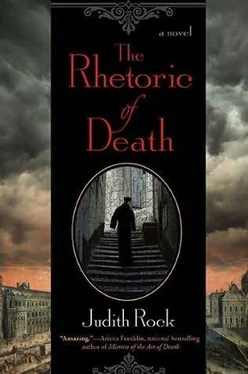Judith Rock - The Rhetoric of Death
Здесь есть возможность читать онлайн «Judith Rock - The Rhetoric of Death» весь текст электронной книги совершенно бесплатно (целиком полную версию без сокращений). В некоторых случаях можно слушать аудио, скачать через торрент в формате fb2 и присутствует краткое содержание. Жанр: Исторический детектив, на английском языке. Описание произведения, (предисловие) а так же отзывы посетителей доступны на портале библиотеки ЛибКат.
- Название:The Rhetoric of Death
- Автор:
- Жанр:
- Год:неизвестен
- ISBN:нет данных
- Рейтинг книги:3 / 5. Голосов: 1
-
Избранное:Добавить в избранное
- Отзывы:
-
Ваша оценка:
- 60
- 1
- 2
- 3
- 4
- 5
The Rhetoric of Death: краткое содержание, описание и аннотация
Предлагаем к чтению аннотацию, описание, краткое содержание или предисловие (зависит от того, что написал сам автор книги «The Rhetoric of Death»). Если вы не нашли необходимую информацию о книге — напишите в комментариях, мы постараемся отыскать её.
The Rhetoric of Death — читать онлайн бесплатно полную книгу (весь текст) целиком
Ниже представлен текст книги, разбитый по страницам. Система сохранения места последней прочитанной страницы, позволяет с удобством читать онлайн бесплатно книгу «The Rhetoric of Death», без необходимости каждый раз заново искать на чём Вы остановились. Поставьте закладку, и сможете в любой момент перейти на страницу, на которой закончили чтение.
Интервал:
Закладка:
Chapter 12
Domine, Iesu Christe, Rex gloriae, libera animas omnium fidelium defunctorum de poenis inferni et de profundo lacu. Libera eas de ore leonis…”
The funeral Mass’s offertory prayer beat like a muffled bell against the black-draped chapel walls. From where he stood with the senior rhetoric class, Charles could just see Antoine, wearing only a small bandage over his cut now, and sitting rigidly upright beside his father on one of the cushioned chairs placed for the Doute family near the candle-banked coffin. The little boy’s shoulders shook as he stared at his brother’s coffin, draped with a silk pall so black, it seemed to absorb all the light there ever was or would be. The priest was asking God to “free the souls of all the faithful departed from infernal punishment,” from “the deep pit” and “the mouth of the lion.” “Lion” meant the devil, and Charles wondered if Antoine was not only grieving for Philippe’s death, but worrying because he’d died unshriven.
Charles could hardly believe that it was only the twenty-ninth of July, that he’d been at Louis le Grand only a week and in that week, one of his students had been murdered. And that in barely more than another week, the ballet and tragedy would be performed. He tried to drag his mind back to the Mass as it neared the words that would make God present in the bread and wine. Philippe’s cousin Jacques Doute, who was serving as acolyte, blinked away tears, picked up a little cluster of bells, and shook them as the rector raised the round white wafer above his head. The gay frivolity of the sound jarred against the dense funereal black of draped walls and coffin pall, vestments and mourning clothes, cassocks and scholar’s gowns.
Charles’s students were dignified and quiet, subdued into a preview of the manhood that would soon be upon them. Charles ached for their having to grapple with Philippe’s death. Not that death was unfamiliar to anyone, young or old. Death descended on every family and took whom it would. But murder, especially the murder of a fellow student, was more than these boys should have to grieve for yet.
Sunlight streamed through the windows and threw a gold and ruby oriole around Pere Le Picart and his assistant priests-Montville, Jouvancy, and Guise-as they moved about the altar. Charles tried not to watch Guise. He didn’t want to swallow the Body of Christ into anger, but even if he did, he had to swallow it. Anyone who refused the sacrament today would set everyone else wondering what they had on their conscience.
Everyone communed and the Mass wound toward its end. “Eternal rest grant unto them, O Lord, and let perpetual light shine upon them.” As Le Picart reached the “amen,” a shrill wail rose from the front of the chapel, as though the soul of the departed were refusing to go anywhere, light or not. But the shrill voice was all too human and Charles wasn’t the only one who recognized it. Students stifled nervous laughter, adults exchanged knowing looks, and Charles, hearing Mme Doute’s name whispered through the nave, pitied Antoine and M. Doute from his heart. Then the organ burst into life, and it would have taken all the wails of hell itself to cut through the throbbing noise.
The Mass’s celebrants and their attendants left the church in solemn procession, and the Doutes were escorted after them through the courtyard door. High-ranking mourners bidden to the funeral feast in the fathers’ refectory went next. Resisting the urge to plug his ears that organ music always gave him, Charles waited until the way was clear and led his boys into the Cour d’honneur.
Glare bounced off the gravel, and in the courtyard’s center, the little Temple of Rhetoric seemed to sag in the heat. The temple, an aging structure of thin wood and paper-mache with a plank floor, was the last of the funeral decorations to have been assembled during the three days that Philippe’s leadcoffined body had lain in state in the chapel. Charles and the rhetoric class had hastily extracted the structure from a cellar early that morning, and set it up to display poems and allegorical drawings (known as emblems) made by students and faculty to honor Philippe. After the funeral meal, the mourners would come to read the elegiac verses and study the emblems. For courtesy’s sake-and to keep too many people from crowding into the fragile structure-Charles and the rhetoric class would take turns guiding the mourners through a few at a time, speaking decorous Latin to the men-whether or not they understood-and French to the women.
“What do we do if it falls down?” Armand Beauclaire whispered anxiously, as the students and Charles stood in a tight group, looking dubiously at the temple. In spite of all their efforts, its thin wood and tired paper-mache looked what they were, shabby and worn with age.
“If it falls down, we act surprised,” Charles said, drawing brief smiles from the somber young faces. “Meanwhile, let’s be out of the sun. There’s food and drink in the senior refectory-get yourselves something and wait there, I’ll join you.”
Admonishing them to keep their gowns on in spite of the heat, he dismissed them to a chorus of groans and watched them cross the court, their scholars’ gowns making them look like a flock of dejected young crows. Wishing he could shed his own cassock, he went up the temple’s three shallow steps and repinned a swag of black drapery hanging between two pillars. Usually the Temple of Rhetoric was the scene of debate competitions and recitations from heroic tragedy, with laurel crowns handed out to the posturing winners. But today it was a monument to real tragedy.
“A terrible thing.” The dancing master Pierre Beauchamps, just emerged from the chapel, stood at Charles’s elbow, impeccably turned out in black taffeta breeches, knee-length coat with ebony buttons, and black plumed beaver hat. He shook out a black lace handkerchief and blotted his perspiring face with it. “Terrible!”
“Yes, maitre, a tragedy,” Charles answered, surprised and pleased that Beauchamps’s feelings had extended beyond lamenting his heroless ballet to grieving for its dead hero.
“I told them last year to get rid of it,” Beauchamps clarified, glowering at the temple. “The thing is a disgrace, it’s falling apart.”
Charles stared at him. “Hardly the worst thing about this day, maitre.”
The dancing master cocked an eyebrow at him. “You think me heartless? I watched Philippe grow up, from the day he came here. I trained him. He was perhaps the best dancer I ever trained outside the Academies and the professional theatre. Be assured that I will grieve for him. After this ballet is over. If it ever is over. I have found us a Hercules.”
“What? Who?” Charles, too, forgot Philippe for a moment.
“A good enough dancer.” Beauchamps sighed gustily. “But whether even I can make a hero out of him, Terpsichore, she only knows. Well. I shall be off, not being invited to the funeral feast. Not that I expected to be, of course.” His voice dripped honeyed venom. “Though I was Philippe’s teacher and nurtured his best talent. But we who are mere practitioners-and not noble theoreticians-know our humble place. Until tomorrow, Maitre du Luc.”
With an austere smile, Beauchamps stalked majestically toward the street door, pausing to raise his hat to a small plump woman dressed in plain black, who bustled out of the chapel and across his path. Mme LeClerc, Charles realized, as she threw up her hands and hastened toward two children talking animatedly together. As she pulled the little girl away, another woman swooped down on the boy, whom Charles saw now was Antoine. The woman hurried him away and Mme LeClerc made for Charles, towing the protesting little girl behind her.
Читать дальшеИнтервал:
Закладка:
Похожие книги на «The Rhetoric of Death»
Представляем Вашему вниманию похожие книги на «The Rhetoric of Death» списком для выбора. Мы отобрали схожую по названию и смыслу литературу в надежде предоставить читателям больше вариантов отыскать новые, интересные, ещё непрочитанные произведения.
Обсуждение, отзывы о книге «The Rhetoric of Death» и просто собственные мнения читателей. Оставьте ваши комментарии, напишите, что Вы думаете о произведении, его смысле или главных героях. Укажите что конкретно понравилось, а что нет, и почему Вы так считаете.












